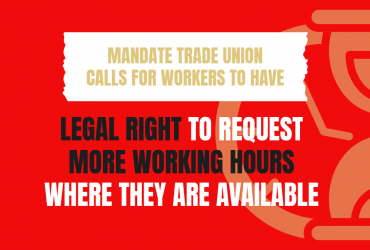Employers launch campaign to stop workers from having secure incomes
Friday 22 September 2017This morning IBEC and the Restaurant Association of Ireland (RAI) appear to have commenced a campaign to prevent low paid and vulnerable workers from achieving any form of secure incomes.
Both organisations were afforded a free run on the national airwaves to discuss the government’s pending legislation which would give workers more security over their hours at work and therefore their incomes.
IBEC had an uncontested appearance on the most listened to radio show in the country, RTE’s Morning Ireland.
The RAI were afforded free reign on Newstalk’s Pat Kenny Show.
No trade union representing workers who would be affected by this legislation were asked to participate in either show, which allowed the employers’ bodies to spin, misinform and lie.
Background
In 2014 Mandate surveyed members in Dunnes Stores, one of the largest private sector employers in the country with 10,000 staff. Dunnes management generally issue 15 hour contracts, but in reality, the average hours worked is closer to 26.
However, should a worker step out of line, lodge a grievance, join a union or a local manager take a dislike to a worker, they can have their hours slashed to 15. Furthermore, spreading those 15 hours over a number of days means the workers’ income is significantly reduced and they cannot access Family Income Supplement (FIS) or part-time social welfare, effectively allowing the employer to manage a worker out of their job by pushing them into poverty.
More than 85 percent of those surveyed stated that allocation of hours was being used as a control mechanism over them. Another regressive element to this type of contract is that workers cannot obtain loans or mortgages because the banks only look at their contracted hours, which in the case of Dunnes Stores workers, means they can only obtain a mortgage of between €25,000 and €35,000. This forces them into the private rental sector where they simply cannot afford to live because of increased rents.
More than 6,000 Dunnes Stores workers took industrial action in April 2015 in order to achieve security over their incomes. TD’s and political representatives from all political parties attended the picket lines, with the Taoiseach Enda Kenny stating that he supported Dunnes Stores workers’ right to know what hours and incomes they would have.
The strike led to the government instigating a study into the prevalence of this type of contract through the University of Limerick. This study showed that while zero hour contracts are not prevalent, “If and When” contracts, like the Dunnes Stores workers’ contracts, are “prevalent in the accommodation/food and retail sectors and in certain occupations in education and health: community care work, so-called ‘bank’ nursing, general practice nursing, university/institute of technology lecturing, adult education tutoring, school substitution, caretaking, and secretarial and cleaning work”.
So this is a big problem.
Immediately after the Dunnes Stores strike, the employer moved on workers who participated in industrial action. They launched a campaign of retribution, using the very issue the workers were highlighting against them. They slashed striking workers’ hours down to 15.
The solution then became an issue for legislators because it is unfair to ask workers in such precarious circumstances to strike when this action can be used against them.
Mandate lobbied all political parties for a change in legislation that would simply allow workers to obtain a contract of employment which reflected the hours they actually work.
Banded Hours Contacts Bill (2016)
David Cullinane TD from Sinn Fein launched this Bill in the summer of 2016. The Bill would enable workers to request a new contract that reflected the average hours worked over the previous six months (as recommended by the University of Limerick report). It would place workers inside a “band” of hours and give them certainty of earnings. This Bill was unanimously supported by the Dail, but Fianna Fail introduced an amendment to delay the Bill by 12 months so that all stakeholders could be consulted. The Bill has now proceeded through the Joint Oireachtas Committee, which had inputs from trade unions, legal experts, business representatives, academics and more. The JOC has now made 23 recommendations – including the increase of the six month “look-back period” to twelve months.
Uncertain Hours Bill
This Bill was put forward in the Seanad by the Labour Parties Ged Nash. It would do similar to the Banded Hours Contracts Bill, but significantly this Bill included anti-victimisation clauses for workers attempting to obtain contracts that reflect the hours they work. The JOC included this in its recommendations under the Banded Hours Contracts Bill.
Government Bill
The government has now announced that it will be prioritising a piece of legislation that will address the concerns of low hour contract workers. Early indications are that this Bill (which hasn’t been published yet) will have an 18 month look back period. Mandate’s position is that this is unacceptable. It allows employers the ability to manipulate hours to ensure workers cannot achieve a decent, secure income.
The Government Bill should at the very least match what was unanimously agreed in the cross party Joint Oireachtas Committee on Jobs.
The Employers’ campaign for insecure work
Today the employers’ lobby is out in full force scaremongering about giving workers security over their incomes.
“It’s the disproportionate nature of a piece of legislation such as the one being proposed,” said Maeve McElwee, Director of Employer Relations with IBEC.
IBEC selectively used elements of the University of Limerick report to try to delay the Bill or block it from passing.
“We don’t have a very significant problem in Ireland with zero hours contracts,” said Ms McElwee.
What she failed to mention was that in Ireland, these zero-hour practices are known as “If and When” practices, which do exactly the same thing.
She goes on to say there are only 5.3 percent of the labour force on “constantly variable working hours” and those on low hours within that are about 2.6 percent.
Sounds impressive. Almost as if this barely effects anyone at all, so what’s the point in legislating for the very low 2.6 percent of workers being abused in this way? But look deeper.
Some workers will be on 10 hour contracts for 15 or 20 years, but regularly work 35 hours. They are not considered in this category because they are not working “constantly variable working hours”, despite the fact that they can have their hours slashed at any time should a local manager take offence to them. Then the 2.6 percent is only from within this category, but it doesn’t tell you that more than 8 percent of the workforce (200,000 workers) are on low hour contracts according to the University of Limerick Report she has already quoted from.
Ms McElwee explained that, “The issue and concerns that we have is around the actual cost of this particular piece of legislation.”
What costs? The Bill would only allow workers to achieve the hours they are already working. There’s no cost.
Interestingly, Ms McElwee attempts to frighten workers about the potential impacts of this legislation.
“This will apply to every employer in the state. It will apply to every employee, whether or not you are working on a, hourly paid contract or not. All salaried employees, all part time employees. It will impact on an employer’s ability to be able to vary your hours upwards because you will be in a band of hours. It will impact on people’s ability to be able to consider a-typical working arrangements, flexibilities, e-working…”
Now this is absolutely disgraceful scaremongering. The legislation only takes effect when a worker requests a review of their hours. They don’t have to request it if they don’t want. And it will not prevent an employer from increasing a workers’ hours above the band of hours should the worker wish to receive more hours. Ms McElwee knows this all too well, but spreads the misinformation anyway.
She continues, “We haven’t seen any regulatory impact assessment undertaken by the government, to consider what the economic cost to employers, themselves included, will be.”
Now this is where it gets interesting. As stated earlier, there is no cost. So why would Ms McElwee say this? Well we would argue that she’s attempting to scare politicians, particularly the government, into thinking there will be huge costs if, god forbid, public sector workers are afforded secure hour contracts too. Also, if there is a cost to the government, this means it would need a money bill which would delay the passing of legislation. This is absolutely not the case, it’s simply disingenuous scaremongering.
We repeat, this legislation would only allow workers a contract that reflects the hours that they are already working.
Including the “regulatory impact assessment” as a request links in this interview with the interview by the Restaurant’s Association of Ireland on Pat Kenny’s Newstalk a number of hours later. Adrian Cummins, the CEO of the Restaurants Association of Ireland called for the exact same thing – which indicates that the employers’ bodies are working together on this campaign to prevent legislation proceeding.
One of the more bizarre elements of Mr Cummins statement includes:
“As a representative of an employers’ body in this country, I find it incredible that we can’t get a meeting with those that are drawing up the legislation. It’s a stone wall, take it or leave it attitude in this country. And if we can get into a room, and sit down, put heads together, we can draw up proper legislation that is fit for purpose for everybody.”
It’s strange, then, that Mr Cummins attended a Joint Oireachtas Committee hearing on the 14th February 2017 to discuss these very issues. In fact, the day he was in the Joint Oireactas Committee, he was joined by Patricia Callan of the Small Firms Association (SFA), Tim Fenn from the Irish Hotels Federation (IHF) and two weeks before ISME, IBEC and Chambers Ireland attended the same Oireachtas Committee to discuss this issue. So be under no illusion, employers have already had their say on this issue and have been part of this process.
Mr Cummins said, “Before anybody does anything and it’s signed into law, let’s look at the costs of doing business in this country because we don’t want to get back to the scenario, in 2008-2009 where running a business was, you know, the costs was so high, they were going to the wall.”
Two things:
• Firstly, that is simply not why business went bust in 2008-2009. They went bust because the government guaranteed private debt and implemented austerity measures to cover it, reducing spending in the economy and putting pressure on workers and subsequently on businesses.
• Secondly, again, this legislation has no cost.
Mr Cummins explained that the University of Limerick Report stated that the retail, healthcare and education sectors had low hour contracts, “but not so much in hospitality area, but we’re all being painted with the same brush at the moment, as bad employers or poor employers or whatever you want to call us”.
This is not true. The Report clearly stated that “If and When” contracts are “prevalent in the accommodation/food and retail sectors…”
It would be interesting to hear what Mr Cummins thinks about the Workplace Relations Commissions’ 2016 Report which states that out of 717 inspections in the Food & Drink industry, almost half (48%) of all employers were in breach of legislation and €332,903 in unpaid wages was returned to workers. That’s an average of €464 per inspection. If this is replicated across the industry, it could be tens of millions of unpaid wages that employers are stealing from their employees on an annual basis. Not exactly an industry full of good employers by the looks of it. But to be fair, exploitation exists in all industries in Ireland.
Mr Cummins called for more consultations. He calls for the regulatory impact assessment to take place before any legislation is passed. This is simply another delay tactic. Workers have been waiting years for this legislation to pass. It has been debated up and down the Oireachtas in Committee’s, in the Dail Chamber, in the Seanad, and the business lobby, including IBEC and the RAI have been party to this.
Earlier today Patricia King, General Secretary of the Irish Congress of Trade Union’s stated, “As employers are already required by law to keep working time records there is nothing in these proposals that would result in any new or additional administrative or regulatory burden, for them.
“Ultimately, the only beneficiaries from increased casualisation in the workforce are bad and exploitative employers. Good employers have nothing to fear from these proposals,” Ms King said.
So today Mandate Trade Union are calling on good employers and employers’ representatives to stop misleading the public, and we’re calling on all members of the Oireachtas to end the delays. Vulnerable workers have waited long enough. Pass the legislation now!





